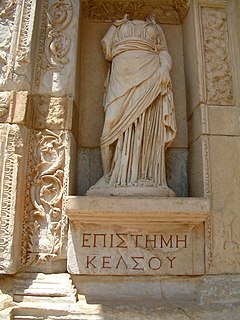This page is based on this
Wikipedia article Text is available under the
CC BY-SA 4.0 license; additional terms may apply.
Images, videos and audio are available under their respective licenses.

A corporation is an organization, usually a group of people or a company, authorized to act as a single entity and recognized as such in law. Early incorporated entities were established by charter. Most jurisdictions now allow the creation of new corporations through registration. Corporations enjoy limited liability for their investors, which can lead to losses being externalized from investors to the government or general public, while losses to investors are generally limited to the amount of their investment.
Dionysius Thrax was a Hellenistic grammarian and a pupil of Aristarchus of Samothrace. His place of origin was not Thrace as the epithet "Thrax" denotes, but probably Alexandria. He lived and worked in this city but later taught at Rhodes.

Business is the activity of making one's living or making money by producing or buying and selling products. Simply put, it is "any activity or enterprise entered into for profit. It does not mean it is a company, a corporation, partnership, or have any such formal organization, but it can range from a street peddler to General Motors."

A multinational corporation (MNC) or worldwide enterprise is a corporate organization which owns or controls production of goods or services in at least one country other than its home country. Black's Law Dictionary suggests that a company or group should be considered a multinational corporation if it derives 25% or more of its revenue from out-of-home-country operations. A multinational corporation can also be referred to as a multinational enterprise (MNE), a transnational enterprise (TNE), a transnational corporation (TNC), an international corporation, or a stateless corporation. There are subtle but real differences between these three labels, as well as multinational corporation and worldwide enterprise.

A joint-stock company is a business entity in which shares of the company's stock can be bought and sold by shareholders. Each shareholder owns company stock in proportion, evidenced by their shares. Shareholders are able to transfer their shares to others without any effects to the continued existence of the company.

"Episteme" is a philosophical term derived from the Ancient Greek word ἐπιστήμη epistēmē, which can refer to knowledge, science or understanding, and which comes from the verb ἐπίστασθαι, meaning "to know, to understand, or to be acquainted with".
Phronesis is an Ancient Greek word for a type of wisdom or intelligence. It is more specifically a type of wisdom relevant to practical action, implying both good judgement and excellence of character and habits, or practical virtue. Phronesis was a common topic of discussion in ancient Greek philosophy.
A telos is an end or purpose, in a fairly constrained sense used by philosophers such as Aristotle. It is the root of the term "teleology", roughly the study of purposiveness, or the study of objects with a view to their aims, purposes, or intentions. Teleology figures centrally in Aristotle's biology and in his theory of causes. It is central to some philosophical theories of history, such as those of Hegel and Marx.
Speculative reason, sometimes called theoretical reason or pure reason, is theoretical thought, as opposed to practical thought. The distinction between the two goes at least as far back as the ancient Greek philosophers, such as Plato and Aristotle, who distinguished between theory and practice (praxis), as well as techne.

A privately held company, private company, or close corporation is a business company owned either by non-governmental organizations or by a relatively small number of shareholders or company members which does not offer or trade its company stock (shares) to the general public on the stock market exchanges, but rather the company's stock is offered, owned and traded or exchanged privately or over-the-counter. More ambiguous terms for a privately held company are closely held corporation, unquoted company, and unlisted company.
Physis is a Greek theological, philosophical, and scientific term usually translated into English as "nature".
The philosophy of technology is a sub-field of philosophy that studies the nature of technology and its social effects.
A company, abbreviated as co., is a legal entity made up of an association of people, be they natural, legal, or a mixture of both, for carrying on a commercial or industrial enterprise. Company members share a common purpose, and unite to focus their various talents and organize their collectively available skills or resources to achieve specific, declared goals. Companies take various forms, such as:
Norman Adrian de Bruyne FRS was born in Punta Arenas Chile on 8 November 1904, baptised on 19 March 1905 at the Anglican Church St. James Church, by the Rev. Edwin Aspinall. His father was Dutch and his mother English. He grew up in England, studied science at the University of Cambridge and became a physics researcher. Around 1930, he became interested in aviation. de Bruyne was the first student of the new flying school which Arthur Marshall established in Cambridge in 1931
Novus Biologicals is a biotech company based in Centennial, Colorado. The company develops, licenses and markets research materials to scientists in academic, corporate and government laboratories. Novus began as a company focused on providing research-grade antibodies for the scientific market. It was acquired by Bio-Techne in 2014.
The Society for Philosophy and Technology (SPT) is an independent international organization founded in 1976 whose purpose is to promote philosophical consideration of technology. SPT publishes Techné: Research in Philosophy and Technology, a tri-annual scientific journal.




